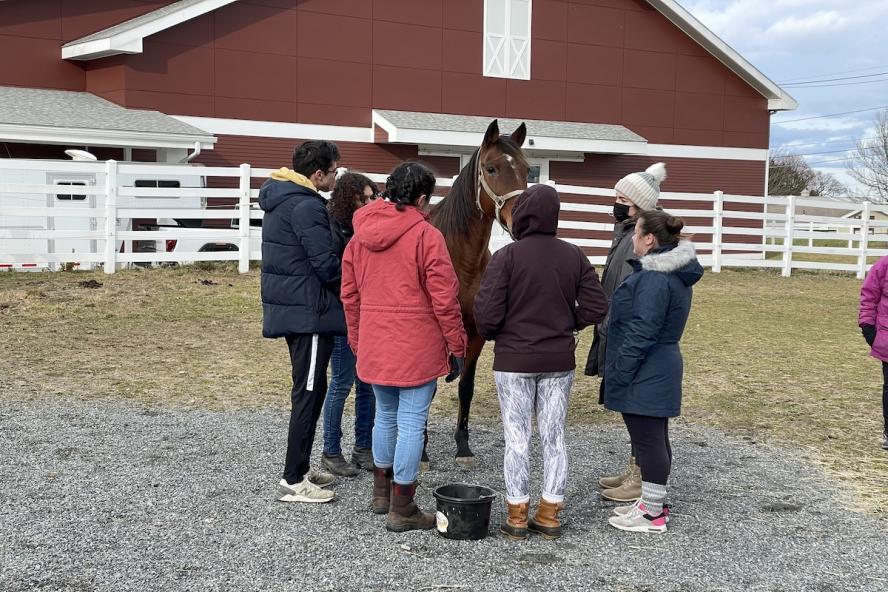-
About
- Leadership & Faculty
- News & Events
-
Admissions
-
Academics
- Graduate
- Advanced Clinical Training
- Continuing Education
- Academic Departments
- Academic Offices
- Simulation Experiences
-
Student Life
- Offices
-
Research
-
- Transformative Research
- Centers & Shared Resources
-
-
Hospitals & Clinics
- Emergency Care
- Hospital Services
-
Community Outreach
- Volunteer
Can Equine-Assisted Learning Help Students Reduce Stress?
Pioneering Cummings School research published in Journal of Veterinary Medical Education

Researchers at Cummings School of Veterinary Medicine at Tufts University are sharing the results about the effectiveness of a unique equine-assisted learning course, posted in advance of print by the Journal of Veterinary Medical Education in December 2022.
Created to help students in the School’s Doctor of Veterinary Medicine program to cope with stress and anxiety—long identified as challenges for this population—researchers worked with the equine teaching herd at Cummings School to develop and offer a weekly course since the start of the 2018–2019 academic year.
Modeled after similar courses offered to medical students at the University of Arizona and Stanford University, the School’s Paddock to Practice course is an elective for students in their first two years of the DVM program, according to Dr. Angeline Warner (she/her), Cummings School associate professor in the Department of Comparative Pathobiology and a co-author of the study.
“I believe our project is the first at a veterinary school and the first research study on effectiveness,” says Warner. “Stress and anxiety have been recognized for several years as serious problems for veterinary students, and unhappily, that correlates with an unexpectedly high suicide rate among these students.”
In addition to Warner, Cummings School’s research team and its Paddock to Practice course facilitators were Dr. Virginia Rentko, former medical director of the Hospital for Large Animals and Henry and Lois Foster Hospital for Small Animals, as well as Foster Hospital’s Client Services Manager Elizabeth Timlege and Social Worker Eric Richman.
“Interventions for stress reduction and improved self-confidence have been introduced at many veterinary schools with the intention of increasing resiliency among students and improving skills for wellness to be used throughout a veterinary career,” the authors shared in the article. “Equine-assisted learning is a non-riding, facilitated discussion method. Exercises with the horses and observation of their behavior provide the basis for reflection and discussion. These activities and discussions improve student confidence, self-assurance, verbal and non-verbal communication, focus, mindfulness, and coping strategies.”
Outcome surveys indicate that students gained significant benefits from course participation. The authors share that the results suggest a similarly created equine-assisted learning course could be helpful to explore students’ personal well-being, professional development, and equine handling skills.
“The students have reported the course to be helpful with stress management, communication skills, and working in teams, as well as equine handling skills,” says Warner.
“We plan to extend our research to evaluate how the horses in our teaching herd react to this course vs. the regular Clinical Skills courses,” Warner shares. “There is research indicating that teaching horses in veterinary training programs that are handled by many inexperienced students can become aversive to handling. So, we need to also consider the stress for the horses.”